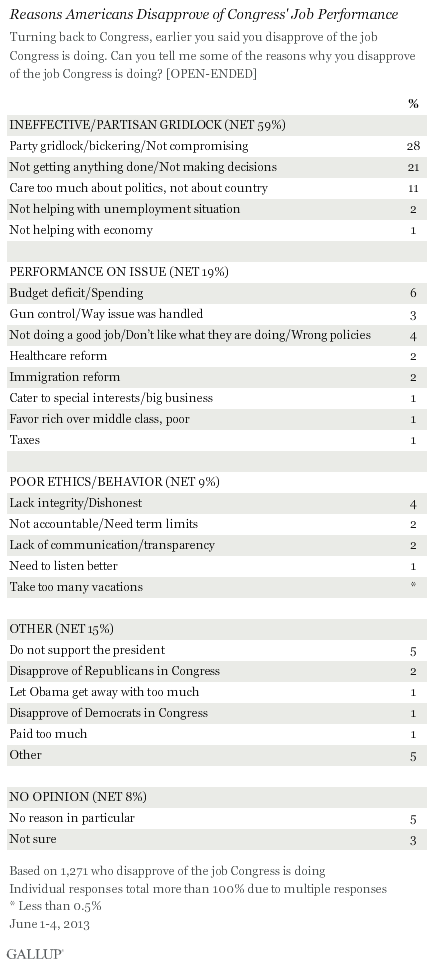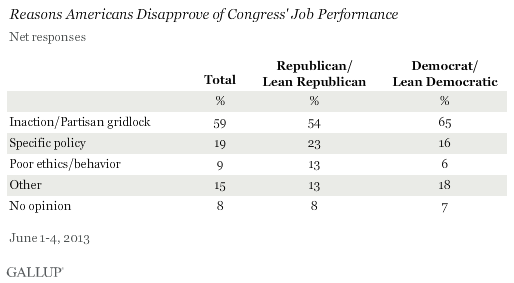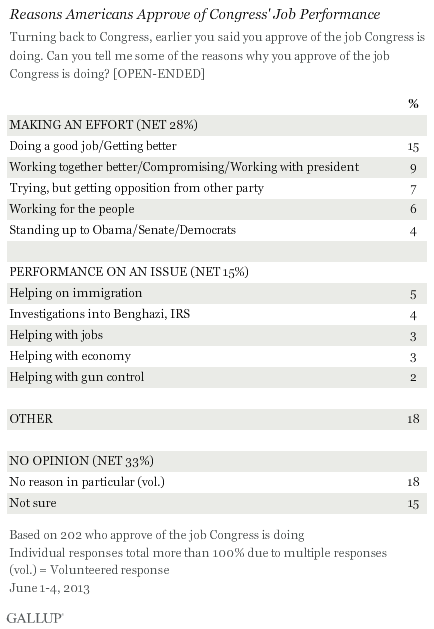PRINCETON, NJ -- Nearly four in five Americans in June, 78%, disapprove of the way Congress is handling its job, marking the 45th consecutive month that more than two-thirds of Americans have given Congress the thumbs down. Americans' high level of disapproval is less about what Congress is doing than about what it isn't doing: putting aside partisan bickering and getting things done.

These results are based on a June 1-4 Gallup poll in which Americans were asked to explain, in their own words, "some of the reasons" they either approve or disapprove of Congress.
The top reason Americans who disapprove of Congress give for their view is partisan gridlock, named by 28%. Relatedly, another 21% cite Congress' failure to accomplish anything or make decisions, and 11% say Congress puts politics ahead of the country. More policy related, 2% cite Congress' failure to address unemployment, and 1% mention lack of action on the economy. Overall, 59% of Congress' detractors mention at least one of these reasons, making congressional inaction the overwhelming criticism Americans express regarding the legislative body.
Aside from this, a net 19% of Americans who disapprove mention congressional action on a specific issue, such as healthcare, taxes, immigration, or gun control as the main reason they disapprove of Congress. Nine percent have complaints about congressional ethics or behavior, ranging from lack of transparency and failure "to listen," to dishonesty and frequency of vacations. Another 8% cannot provide a specific reason for their negative view of Congress.
Majority of Democrats and Republicans Who Disapprove Name Inaction as Reason
Democrats who disapprove of Congress are a bit more likely than their Republican counterparts to cite inaction by Congress as the reason, 65% vs. 54%. This is largely owing to more Democrats specifically citing partisan gridlock and lack of compromise. Republicans, on the other hand, are slightly more likely than Democrats to mention policy disagreement with Congress, particularly related to the budget and healthcare.

Congress Praised Mainly for Effort
Nonetheless, even a deeply unpopular institution such as Congress is not without its fans. Seventeen percent of Americans in June approve of the job Congress is doing, similar to the 16% recorded in May, and up slightly from 14% in January. The most common individual response Americans give for approving of Congress is that it's doing a good job or is getting better, mentioned by 15%. Another 9% praise Congress for working better across party lines, while 7% applaud at least one party for "trying."
Altogether, Gallup finds 28% of Congress' supporters crediting Congress with some sort of effort. Half as many, 15%, cite congressional success on a specific issue, including immigration or the investigations into Benghazi or the IRS, while 18% mention other reasons. However, the largest category of responses given for approving of Congress is "don't know," as one-third who approve can't articulate a specific reason.
Even in this survey of more than 1,500 national adults, there are too few Congress approvers to break out the results by party.

Bottom Line
Although President Barack Obama's job approval rating is hovering near 50% and Americans' confidence in the economy is approaching positive territory for the first time in more than five years, Congress' job rating remains stuck below 20%. One reason Congress' negative ratings persist could be gridlock fatigue. With party control of the U.S. House and Senate divided between Democrats and Republicans since 2011, Americans may have had their fill of partisan rancor in Congress. Relatedly, many see Congress as simply ineffective -- unable to pass a budget or address the nation's problems in a meaningful way. On the flip side, the best praise its backers can give Congress is that its members are trying. But relatively few can point to a specific issue they think it has addressed particularly well.
What this means for the future is unclear. Congress' approval was similarly low in 2012, yet that election resulted in little turnover, preserving a divided Congress. As long as more Americans approve than disapprove of the job their own member of Congress is doing, as Gallup found in May, the status quo could persist. However, with that level of approval falling short of majority (46%), 2014 could bring about more change.
Survey Methods
Results for this Gallup poll are based on telephone interviews conducted June 1-4, 2013, on the Gallup Daily tracking survey, with a random sample of 1,529 adults, aged 18 and older, living in all 50 U.S. states and the District of Columbia.
For results based on the total sample of national adults, one can say with 95% confidence that the maximum margin of sampling error is ±4 percentage points.
Interviews are conducted with respondents on landline telephones and cellular phones, with interviews conducted in Spanish for respondents who are primarily Spanish-speaking. Each sample of national adults includes a minimum quota of 50% cellphone respondents and 50% landline respondents, with additional minimum quotas by region. Landline telephone numbers are chosen at random among listed telephone numbers. Cellphone numbers are selected using random digit dial methods. Landline respondents are chosen at random within each household on the basis of which member had the most recent birthday.
Samples are weighted to correct for unequal selection probability, nonresponse, and double coverage of landline and cell users in the two sampling frames. They are also weighted to match the national demographics of gender, age, race, Hispanic ethnicity, education, region, population density, and phone status (cellphone only/landline only/both, cellphone mostly, and having an unlisted landline number). Demographic weighting targets are based on the March 2012 Current Population Survey figures for the aged 18 and older U.S. population. Phone status targets are based on the July-December 2011 National Health Interview Survey. Population density targets are based on the 2010 census. All reported margins of sampling error include the computed design effects for weighting.
In addition to sampling error, question wording and practical difficulties in conducting surveys can introduce error or bias into the findings of public opinion polls.
View methodology, full question results, and trend data.
For more details on Gallup's polling methodology, visit www.gallup.com.
